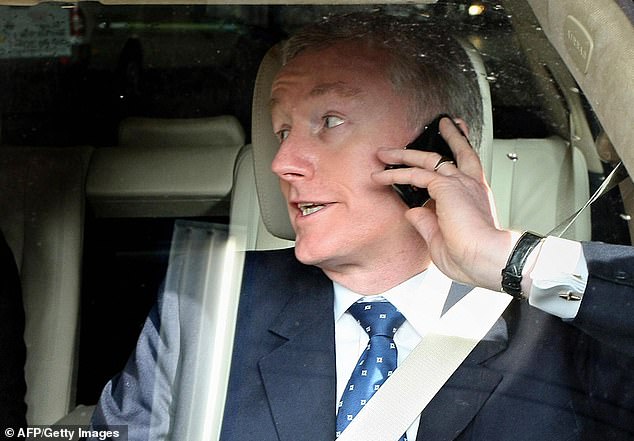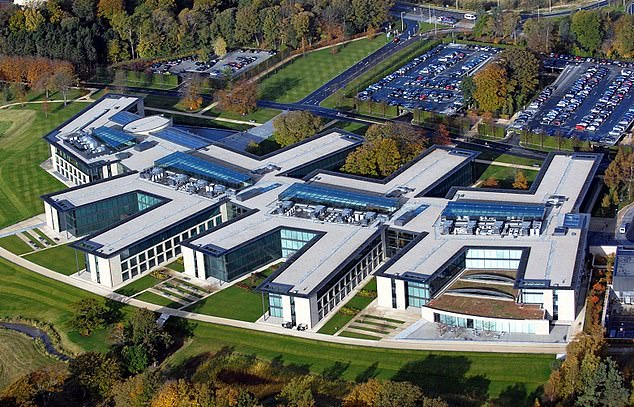One Saturday just before Christmas 2007, there was a knock at the Edinburgh home of the late Alistair Darling, who was then Chancellor of the Exchequer in Gordon Brown’s Labour Government. On the doorstep, proffering a gift-wrapped panettone, was Fred Goodwin, the boss of Royal Bank of Scotland (RBS), who lived nearby.
This was no social call: Goodwin had come to beg for help to keep his bank afloat. His visit was Darling’s first foreboding of the catastrophe that would engulf RBS a few months later, culminating in a £45 billion taxpayer bailout.
A much-mourned Darling died in 2023. A disgraced Goodwin lives a quiet life on a £600,000-a-year pension from the bank he almost destroyed. Neither man could have imagined on that December day that it would take 17 long, strife-ridden years before that bank would finally emerge from state ownership.
It is a milestone moment and an opportune one to reflect on the mistakes of the past as well as prospects for the future.
As Sir Howard Davies, who was chairman of NatWest for nearly ten years from 2015 on, says of Friday’s sale: ‘It won’t make a huge amount of difference in itself. It is in a territory somewhere between practical and symbolic.’
The symbolism is potent. The story of RBS is one of arrogance, hubris, and powerful men believing they are above the rules. These are perils that plague us just as much today as they did in 2008. Paul Thwaite, the current chief executive, was a young, relatively junior banker at RBS in 2008. He said of the bailout: ‘I didn’t know Fred, but it did shape my mindset.
‘The enormity of the role banks play in economies and the lives of customers hit home.
‘I wanted to be part of a team to put things right and to repay a debt of gratitude to taxpayers for the bailout. We are very grateful for the taxpayer stepping in.’

Fred Goodwin, former boss of Royal Bank of Scotland, begged Alistair Darling – Chancellor of the Exchequer in 2008 – for help to keep his bank afloat
The NatWest of 2025 bears mercifully little resemblance to the RBS of the crisis era, when it had been turned into a vehicle for the overweening ambition of Goodwin, known as Fred ‘The Shred’ for his ruthless approach.
Today’s bank is smaller and safer, with a balance sheet of just £708 billion compared with £2.2 trillion back then. It made a £6.2 billion profit in 2024, a happy contrast with 2008, when there was £40.7 billion of red ink.
The bank is even back on the takeover trail, having recently made an £11 billion approach for the retail banking arm of Santander UK, though this has been rebuffed for being too low.
At this final reckoning, British taxpayers have lost more than £10 billion through the bailout – money that could have paid for schools and hospitals and will now never be recovered.
Entrepreneurs lost businesses through the rapacious behaviour of the bank’s Global Restructuring Group (GRG) unit, which was supposed to help troubled firms but stripped their assets instead.
Ross McEwan, chief executive from 2013 to 2019, says: ‘There was always concern as to whether the Government would get its money back but the priority was to stabilise the UK financial system. If RBS had tipped over it would have been a catastrophe. We were within hours of running out of cash at ATMs.’
The toll it took on shareholders, particularly private investors and employees who were induced to put their money into a disastrous capital raising in 2008, was, he says, heartbreaking.
‘I was running a forum for retail bank staff and I saw a woman quietly walking away so I stopped her. She said to me she had put money into that capital raising.
‘She said: ‘Ross, you don’t understand how much money my family lost – it was money going into our retirement and our grandchildren’s education.’
The roots of the bank’s downfall lay further back in 2000 in the £21 billion takeover of NatWest by RBS. It was a David and Goliath affair, as the Scottish bank was much smaller than its prey.
The hostile bid – masterminded by a young Goodwin and his mentor Sir George Mathewson, chief executive of RBS and later chairman – was one of the first I covered as a neophyte City journalist.
Their success in the NatWest deal took many by surprise, including the big-name commentators of the day, who were backing a rival offer from Bank of Scotland. After covering the deal day-in, day-out, speaking to shareholders and getting to know Goodwin and Mathewson better, it did not surprise me.
The first few years after the bid were heady. Goodwin took over from Mathewson as chief executive. A car enthusiast, he hobnobbed with his hero, the racing driver Sir Jackie Stewart. He gained entry into Royal circles and was knighted in 2004, only to be stripped of the honour after the bank imploded.
In his new-found pomp, he built a lavish new HQ at Gogarburn outside Edinburgh, complete with seafood kitchens serving his favourite dish of scallops. He flew around in the bank’s private jet.
Appetite whetted by NatWest, he went on a deal-making spree.
As McEwan says: ‘Remember, this was at one point the largest bank on Planet Earth. It had a balance sheet of £2.2 trillion pounds. It was in 54 countries.
‘I wouldn’t just blame it on Fred. There was a board, there were investors that signed off on every deal. Had they all gone tonto? Yes, they had got to a point where they just didn’t think they could lose.’
The scale of the expansion had started to rattle shareholders and City analysts. But when Barclays launched a bid for Dutch bank ABN Amro, Goodwin could not resist muscling in.
I remember a lunch with him in his office in 2007, when I was Business Editor of the Observer. We discussed the bid: he seemed unperturbed by the storm clouds gathering. I left, feeling bemused.
The €71 billion (£60 billion) deal, done in 2007 as a consortium with Santander and Fortis, was the precursor to disaster. When the global financial crisis struck in autumn 2008, shares in RBS, which was exposed to the American subprime mortgage market, lost 87 per cent of their value.
To avert a collapse, the Government provided a multi-billion pound bailout, taking a significant stake in the bank. Goodwin was ousted, to be replaced by Stephen Hester, a respected banker who is now chairman of EasyJet.

RBS’s Gogarburn complex outside of Edinburgh. In 2008, the bank was the largest in the world
Hester ran the bank for five years from 2008 to 2013 and stabilised its finances.
Under McEwan, the bank’s structure was streamlined. That included selling off non-core businesses and returning it to its roots serving UK personal and corporate customers.
The bank also reached a multi-billion pound settlement with the US authorities for selling the toxic sub-prime mortgage bonds in the run-up to the crisis.
According to Davies, the US settlement and Covid were the main reasons it took so long for the Government to sell out.
He says: ‘I took over in 2015 and assumed that well before the end of my term the bank would be completely in the private sector.’
McEwan’s successor, Dame Alison Rose, told me she was convinced the bank would fully free itself from Government ownership while she was in charge.
She would probably have been right, had it not been for a few unguarded remarks she made over dinner to a journalist concerning the ‘de-banking’ of Reform leader Nigel Farage that led to her defenestration.
She was replaced by Thwaite, under a new chairman, the industrialist Rick Haythornthwaite.
The pair are looking to grow the business, mainly under the bank’s own steam, though they are also back in the deals game. Thwaite recently bought Sainsbury’s Bank and a £2.5 billion mortgage portfolio from Metro Bank.
‘Rick and I are ambitious for the bank, but we have learnt the lessons around financial discipline’ he says of deal-making.
‘Now we have a simple, low-risk business model and much safer regulation.’
‘There’s no complacency. I am very grateful to the British taxpayer. Returning to private ownership is a new chapter for the bank.’
SAVE MONEY, MAKE MONEY

Isa offer

Isa offer
40% off account fees for six months

Fix energy bills

Fix energy bills
Check price cap beating deals with uSwitch

Fee-free Isa investing

Fee-free Isa investing
Free share and ETF dealing, no account fee
5.70% cash Isa
5.70% cash Isa
Rate boosted for three months, then 4.85%

Get £20 off an MOT

Get £20 off an MOT
£20 This is Money Motoring Club voucher
Affiliate links: If you take out a product This is Money may earn a commission. These deals are chosen by our editorial team, as we think they are worth highlighting. This does not affect our editorial independence. Terms and conditions apply on all offers.












